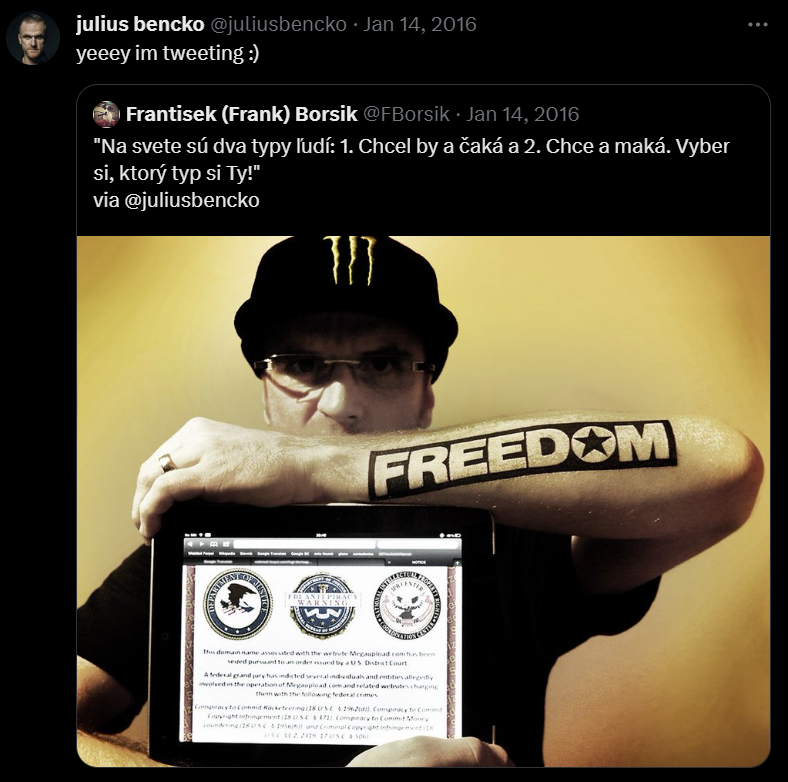 The wheels of justice in the Megaupload case may have moved at a glacial pace over the last 11 years but there’s no doubt they continue to move.
The wheels of justice in the Megaupload case may have moved at a glacial pace over the last 11 years but there’s no doubt they continue to move.
After entering into a
plea deal
with New Zealand authorities, last week former Megaupload coders Mathias Ortmann and Bram van der Kolk were sentenced at the High Court in Auckland to a total of
five years in prison
, to be served in New Zealand.
Kim Dotcom is still wanted in the United States but seems more comfortable fighting extradition than cutting a deal that requires him to admit guilt. Ortmann and van der Kolk had held out for many years, but the prospect of not being imprisoned in the United States was too good to refuse.
Whether former Megaupload programmer Andrus Nomm negotiated his fate is still unknown. After being indicted along with the others in 2012, the Estonian was reported as living in the Netherlands. In February 2015, Nomm
suddenly surfaced
in Alexandria, Virginia, the district where the Megaupload indictment had been filed three years earlier. Within days he was serving a
one-year prison sentence
but was a
free man within months
.
Julius Bencko, Graphic Designer
In the United States government’s superseding indictment dated February 16, 2012, Julius Bencko is described as a citizen and resident of Slovakia. A talented graphic designer, Bencko was responsible for Megaupload’s logo and ensuring that other sites in the group looked good and accommodated advertising properly.
 According to the United States government, this work earned Bencko more than $1 million in 2010 alone. Even for the guy responsible for integrating Megaupload’s Flash player, that was still pretty good money.
According to the United States government, this work earned Bencko more than $1 million in 2010 alone. Even for the guy responsible for integrating Megaupload’s Flash player, that was still pretty good money.
The important context here is that Bencko was the director and sole shareholder of Basemax International Limited and through that entity, he effectively held 2.5% of Megaupload’s shares. For someone who supposedly played a key role in the most significant piracy conspiracy of all time, the allegations against Bencko were underwhelming and, at times, borderline comical.
Around October 4, 2007, Bencko sent an email to van der Kolk asking for a favor. “Can u pls get me some links to the series called ‘Seinfeld’ from MU?” Less than two weeks later an apologetic Bencko emailed again. “Sorry to bother but if you would have a second to find me some links for the ‘Grand Archives’ band i’d be very happy.”
If being polite was a crime, Bencko had been caught in the act at least twice but the indictment offered even more. In at least two emails sent by Dotcom to Bencko and his colleagues, all were roundly criticized for deleting too much content in response to copyright holder complaints.
“I told you many times not to delete links that are reported in batches of thousands from insignificant sources,” Dotcom wrote, according to the indictment. “I would say that those infringement reports from MEXICO of ‘14,000’ links would fall into that category. And the fact that we lost significant revenue because of it justifies my reaction.”
Fugitive on the Run?
Unlike his colleagues, Bencko didn’t fly to New Zealand to celebrate Dotcom’s birthday in January 2012. That meant he also missed out on a once-in-a-lifetime opportunity to be targeted by
dozens of armed officers
from the Special Tactics Group, New Zealand’s elite anti-terror force.
With his former colleagues’ names rarely out of the media for long, Bencko spent much of 2012 and early 2013 retweeting news about the Megaupload case. “I miss my MEGA friends / colleagues,” he declared in a rare personal tweet in July 2013. A year later, Bencko was posting videos of car restorations under his Pixelhood brand, but showing no obvious concerns about his fate in the Megaupload case.
At this point, various explanations seemed potentially reasonable. Had designing logos and making websites look pretty begun to look less attractive to prosecuting authorities than they had done a couple of years earlier? Maybe Bencko had agreed to sing like a canary in exchange for the ‘freedom’ depicted in this January 2016 tweet?
While that seemed unlikely, almost anything seemed more likely than the Slovakian freely walking around Europe being polite to people, because nobody cared about the indictment anymore.
It was more than 11 years in the making but earlier this month, authorities in Europe organized a smaller armed raid just for Bencko.
Czech Police Executed International Arrest Warrant
The announcement on the Czech police website does not name Julius Bencko as the person of interest but supporting information makes it extremely unlikely it could be anyone else.
The statement reveals that after obtaining information relating to the movements of a wanted man, officers from the Department of Foreign Police (which handles illegal migration, crimes involving foreigners, and cross-border crime) arrested a 46-year-old man in Prague.
Police report that the man was the subject of an international arrest warrant issued in Virginia, United States, after being “convicted of several crimes such as extortion, copyright infringement, or money laundering.”
Police Arrest Bencko at Prague Hotel
The authorities say that police received information that their target was staying at a hotel in the Prague 1 district. Bodycam footage shows armed police approaching a hotel room marked ’43’ at 01:19 on June 7, 2023. A man responds to a quiet knock on the door before the officers immediately push inside to restrain him.
“A sleepy man opened the door for [officers] in the middle of the night, and the police immediately arrested him,” the official report reads. Police say the man “was armed with several knives” but thanks to the “very quick intervention of the police, he was unable to put up any resistance.”
Nothing in the video indicates that Bencko was armed with a knife or that he even considered any kind of struggle. At one point the officers ask Bencko for documents, but at least 13 minutes pass before the graphic designer is handcuffed and led outside to a waiting police car.
“After the arrest, the forty-six-year-old foreigner was taken to the police station, from where he was escorted to the issuing custody after all police actions had been performed,”
Czech police
continue.
“Upon request, he will travel back to the United States, where he will serve out his many-year sentence.”
The full video can be downloaded
here
(.mp4)
From:
TF
, for the latest news on copyright battles, piracy and more.
chevron_right






 Dairo Antonio Usuga, alias Otoniel (au centre), a été extradé vers les Etats-Unis le 4 mai 2022.
Dairo Antonio Usuga, alias Otoniel (au centre), a été extradé vers les Etats-Unis le 4 mai 2022.

